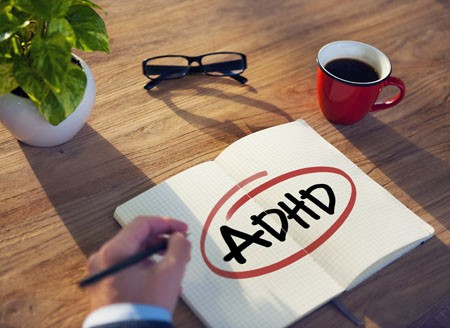Surprisingly, Adult ADHD Is Distinct From Childhood ADHD
In a longitudinal study of 1,037 people born in Dunedin, New Zealand in 1972 and 1973, most participants with attention deficit hyperactivity disorder (ADHD) in adulthood did not have the disorder as children. The study by Terrie E. Moffitt and colleagues in the American Journal of Psychiatry is the first prospective longitudinal study to describe the childhood of adults with ADHD.
When the study participants were children, about 6% were diagnosed with ADHD (mostly males). These children also had comorbid disorders, neurocognitive deficits, multiple genes associated with risk for ADHD, and some life impairment when they reached adulthood.
In adulthood, about 3% of the participants had ADHD (roughly equal between men and women), and 90% of these participants had no history of ADHD in childhood. The participants with ADHD in adulthood also had substance dependence and life impairment, and had sought treatment for the disorder. The researchers were surprised to find that these participants with adult ADHD did not show neuropsychological deficits in childhood, nor did they have the genetic risk factors associated with childhood ADHD.
If the findings of this study are replicated, researchers will have to rethink the current classification of ADHD as a neurodevelopment disorder that begins in childhood, and begin to determine how adult ADHD develops.
Editor’s Note: Before the publication of this article, most investigators (including this editor Robert M. Post) thought that virtually all ADHD in adulthood evolved from the childhood disorder, and if it did not begin in childhood, the diagnosis was suspect. I still believe the ADHD that appears in adulthood in patients with bipolar disorder is likely attributable to residual depression and anxiety or hypomania and that more concerted treatment of the patient to full remission will often result in much better attention, concentration, and ability to follow through and stay on task.
Low Vitamin D Levels in Childhood Can Predict Hardening of the Arteries in Adulthood
A new study from Finland suggests that low vitamin D levels in childhood and adolescence can predict atherosclerosis, or hardening of the arteries, in adulthood. The study, by Markus Juonala and colleagues in the Journal of Clinical Endocrinology & Metabolism, included 2,148 people whose vitamin D levels were measured at ages 3–18. They were checked for atherosclerosis at ages 30–45. Those participants with the lowest levels of vitamin D in their youth were at much higher risk for thickened arteries as adults. The finding was independent of other cardiovascular risk factors such as smoking, high blood pressure, poor eating, lack of exercise, and obesity.
Editor’s Note: While it is not yet clear if low vitamin D levels directly cause the development of atherosclerosis, it is important to maintain sufficient vitamin D in childhood for a host of reasons, including strong bones. Children with sufficient vitamin D levels are more likely to have normal moods and behavior than those deficient in vitamin D.
Antidepressants Work Better in Major Depressive Disorder than Previously Thought
As we’ve written before, the popular media has sometimes questioned the efficacy of antidepressants for unipolar depression. A reanalysis of data from previous controlled trials of fluoxetine and venlafaxine that was recently published in the Archives of General Psychiatry provides new evidence that these drugs are significantly more efficacious than placebo in youth, adult, and geriatric populations with major depressive disorder.
The researchers concluded,
To our knowledge, this is the first research synthesis in this area to use complete longitudinal person-level data from a large set of published and unpublished studies. The results do not support previous findings that antidepressants show little benefit except for severe depression. The antidepressants fluoxetine and venlafaxine are efficacious for major depressive disorder in all age groups, although more so in youths and adults compared with geriatric patients. Baseline severity was not significantly related to degree of treatment advantage over placebo.
Studies in Adults Shed Light on the Prevalence of Childhood Bipolar Disorder and the Need for Early Treatment
At the 2011 Pediatric Bipolar Disorder Conference in Cambridge, Massachusetts this past March, Dr. Andrew Nierenberg from Massachusetts General Hospital presented a plenary paper, “What can we learn about bipolar youth from bipolar adults in 2011?”
Since it appears that a substantial number of bipolar adults experience illness onset in childhood, Nierenberg said that a useful approach to treating the illness over the lifetime is to begin treatment in childhood. Early intervention may be more effective and easier to accomplish than treatment much later in the course of illness after multiple pathological psychological, biochemical, and physiological occurrences and interactions have occurred.
Nierenberg’s research was gleaned from reviewing several studies that indicated that a substantial subgroup of bipolar adults had an early age of onset. He included data from his own STEP-BD studies published by Perlis et al. in Biological Psychiatry in 2004 and data from our Bipolar Collaborative Network published by Post et al. in the British Journal of Psychiatry in 2008, as well as a study by Hamshere et al. published in the Journal of Affective Disorders in 2008, a study by Goldstein and Levitt published in the American Journal of Psychiatry in 2006, research by Ortiz et al. and by Bauer et al. both published in Psychiatry Research in 2010, and a study by Baldessarini et al. published in the Journal of Affective Disorders in 2010.
These studies indicate that one-fifth to a quarter of adult outpatients with bipolar disorder experienced illness onset prior to age 13, and one-half to two-thirds of patients experienced their onset in childhood or adolescence, i.e., before age 19.
Memantine for Adult ADHD
At the 57th Annual Meeting of the American Academy of Child and Adolescent Psychiatry (AACAP) in October 2010, Craig Surman of Massachusetts General Hospital reported results from an open study suggesting that the anti-Alzheimer’s drug memantine (Namenda) was effective in the treatment of ADHD in adults.
Editor’s Note: Gianni Faedda also indicated to this writer that he had successfully used memantine, an antagonist of the glutamate NMDA receptor, for children with ADHD. He observed that memantine was also helpful in several of his treatment-resistant bipolar patients. Based on these anecdotal observations, this compound deserves further systematic exploration. It is also noteworthy that Amit Anand and colleagues found that memantine increased antidepressant response to lamotrigine in bipolar depression compared to placebo.





